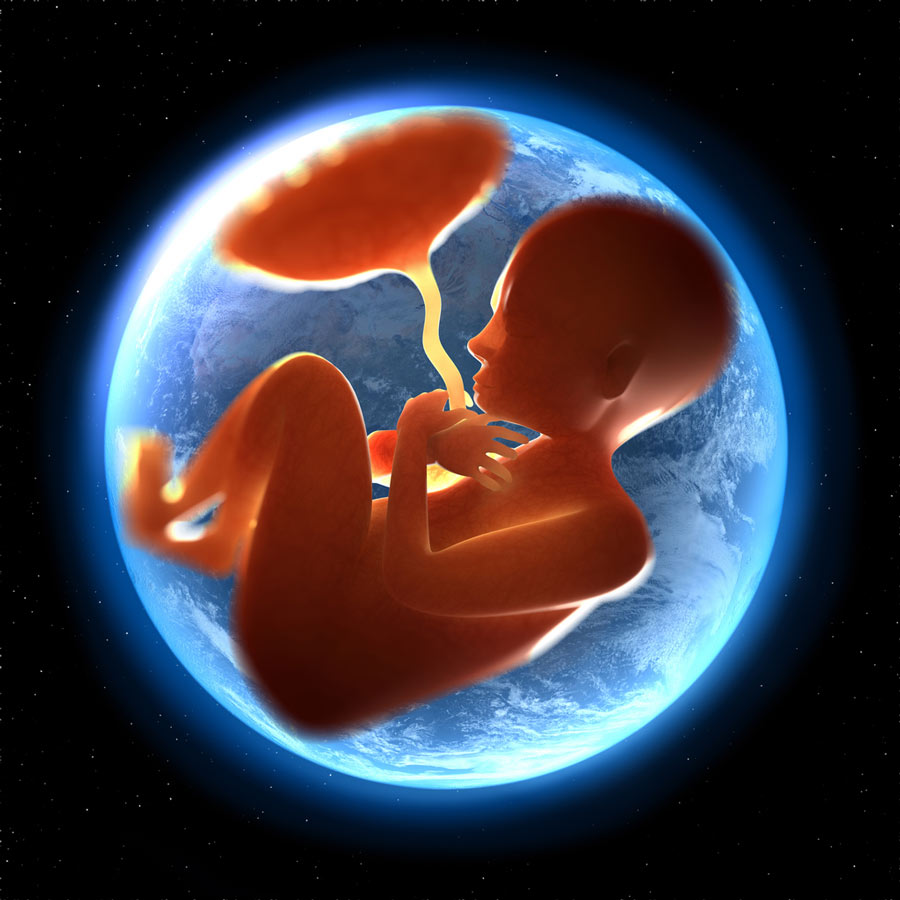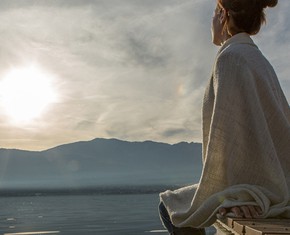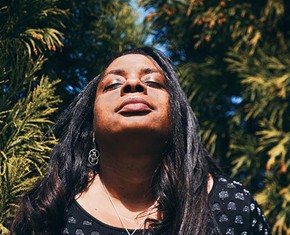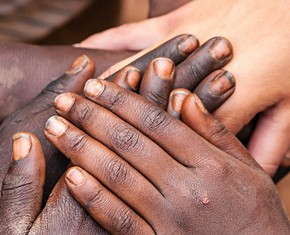The views expressed in our content reflect individual perspectives and do not represent the authoritative views of the Baha'i Faith.
The ultimate purpose of life is often difficult to fathom—that’s why faith has played such a significant role in the human experience.
We may say, as a matter of faith, that we believe God has a plan for our lives; but if we are honest with ourselves, much of the time we may see only chaos, confusion, and disappointment. Sometimes, no matter how great our faith may be, things seem to get worse far more rapidly than we can ever make them better.
Inevitably, at some point, we ask ourselves, What is the purpose of this life? Why are we here? Within the great scheme of things, we really would like to know what it all means and what God has planned for us personally, especially when we find ourselves surrounded by challenges and difficulties.
The problem is that any answer we come up with seems rather unsatisfactory. It doesn’t explain the meaning of what we are experiencing or the purpose of our lives. Getting older helps. The more we mature, the more we understand about the ways of this world. We learn to see beyond chaos to the underlying order of things; we replace confusion with the power of reason and find fulfillment in what we do for others rather than disappointment in what others don’t do for us. When we can look back on our lives, we can see more fully what we could not comprehend while it was happening to us as youngsters. Perhaps the greatest advantage of growing older is hindsight.
With hindsight we can compare who we used to be with who we are now; we can see how our basic outlook has changed over a lifetime. Looking back on the lessons of life, we can see that learning new things was ultimately not as difficult as unlearning old things. When we were young, we made assumptions about life and the world, which we later came to see as overly simplistic, woefully inadequate, or just downright wrong. These dawning realizations all provide signs of spiritual growth, but seeing ourselves become wiser than we once were doesn’t necessarily lead to understanding our ultimate purpose in life.
 To achieve this, it may be useful to look at a different part of our lives—our pre-existence in our mother’s womb—and relate it to where we’re all headed. As the Baha’i teachings say: “This world is but the womb of the world of reality.” – Abdu’l-Baha, Divine Philosophy, p. 112.
To achieve this, it may be useful to look at a different part of our lives—our pre-existence in our mother’s womb—and relate it to where we’re all headed. As the Baha’i teachings say: “This world is but the womb of the world of reality.” – Abdu’l-Baha, Divine Philosophy, p. 112.
Before we were born, we spent about forty weeks in a different world, a small, confined space separated from this world by a few thin layers of tissue. The purpose of these layers was to protect and nurture us until we were ready to emerge. This was the womb-world; in a sense, it was a world within a world. Now, let’s ask the same questions again, but this time in retrospect. Instead of asking, What is the purpose of this life? Why are we here? Let’s ask, What was the purpose of that prenatal life? Why were we there? These questions are remarkably easier to answer because it is clear that the purpose of our prenatal lives was to prepare us for this world, the world outside the womb.
In the womb, we had everything we required: warmth, sustenance, and shelter. Through the placenta and umbilical cord, everything we needed came to us without request or effort, without choice or volition. It was a wonderful little world where everything was given to us. Even though we spent all of our time preparing to leave that small world, we were unaware that this was what we were doing. There was no reason to think of leaving because we were perfectly fine where we were. Besides, we were completely unaware of the existence of any other place. We didn’t know that there was a vast world all around us just outside the womb, or that it had always been there. We couldn’t know; we had not yet developed the sensory equipment to perceive it properly.
Within the womb, we grew things we had little use for in that environment, the reasons beyond our comprehension at the time. We grew hands, feet, and eyes in a place where there was little to hold, no place to walk, and nothing to see. Enveloped in that watery environment, we grew lungs in a place without air to breathe. Even though we remained unaware of the process of growth and development, we became less and less suited to remain where we were, and more and more prepared for where we were going. Things were getting progressively tighter, and our movements were becoming more restricted. Eventually, we completely outgrew the womb.
Only from our present after-womb vantage point can we understand the ultimate purpose of life in the womb and see that, in a sense, we had to die out of that one world to be born into the next. While we were in the womb, we could not conceive of going to a place where we would leave behind the umbilical cord, placenta, and amniotic fluid of the womb, which were far more important to our survival than the strange appendages we were growing. Imagine what would have happened if we could have chosen not to develop these limbs and members because they seemed useless in the womb. We would be handicapped at the very least—perhaps even unable to survive in this world.
Similarly, the purpose of this earthly world beyond the womb is to provide us with the opportunities we need to develop those spiritual faculties that will best serve us in the life hereafter. We can make choices about which virtues—that is, which spiritual faculties—we will develop. These virtues may at times seem to be of little use in this world, but they will be vital in the next:
The purpose of the one true God in manifesting Himself is to summon all mankind to truthfulness and sincerity, to piety and trustworthiness, to resignation and submissiveness to the will of God, to forbearance and kindliness, to uprightness and wisdom. His object is to array every man with the mantle of a saintly character, and to adorn him with the ornament of holy and goodly deeds. – Baha’u’llah, Gleanings from the Writings of Baha’u’llah, p. 299.
The remembrance of God in prayer, in attitude, and in action will help us acquire these virtues of character. With effort and time, they grow more substantial, eventually becoming manifest in everything we do. The virtues we manifest and cultivate shape our identity and character while we are still in this world and can greatly assist us in dealing with life’s challenges. In the spiritual realm beyond this physical life these virtues define who we are. Metaphorically, they are our spiritual limbs and members:
Man—the true man—is soul, not body … – Abdu’l-Baha, Paris Talks, p. 86.
It is only by the breath of the Holy Spirit that spiritual development can come about. No matter how the material world may progress, no matter how splendidly it may adorn itself, it can never be anything but a lifeless body unless the soul is within, for it is the soul that animates the body; the body alone has no real significance. Deprived of the blessings of the Holy Spirit the material body would be inert. – Ibid., p. 133.
Love is heaven’s kindly light, the Holy Spirit’s eternal breath that vivifieth the human soul. … Love is the one means that ensureth true felicity both in this world and the next. Love is the light that guideth in darkness, the living link that uniteth God with man, that assureth the progress of every illumined soul. – Abdu’l-Baha, Selections from the Writings of Abdu’l-Baha, p. 27.
The spiritually learned must be characterized by both inward and outward perfections; they must possess a good character, and enlightened nature, a pure intent, as well as intellectual power, brilliance and discernment, intuition, discretion and foresight, temperance, reverence, and a heartfelt fear of God. For an unlit candle, however great in diameter and tall, is no better than a barren palm tree or a pile of dead wood. – Abdu’l-Baha, The Secret of Divine Civilization, pp. 33-34.
We must strive unceasingly and without rest to accomplish the development of the spiritual nature in man. … For the body of man is accidental; it is of no importance. The time of its disintegration will inevitably come. But the spirit of man is essential and, therefore, eternal. – Abdu’l-Baha, The Promulgation of Universal Peace, p. 60.
















Comments
Sign in or create an account
Continue with Googleor